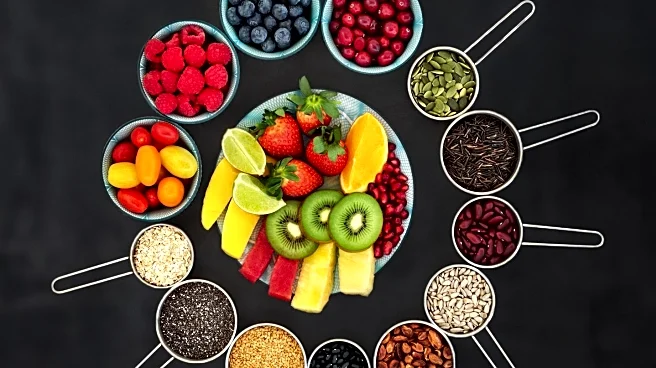What's Happening?
Viridian Nutrition has conducted research highlighting a significant gap in label literacy among multivitamin consumers. The study found that while three-quarters of supplement users prefer products without
artificial additives, only eight percent can define what a filler is, and fewer than one in four read the full ingredients list. This comes at a time when more people are relying on supplements to fill nutritional gaps, as food crops have lost significant amounts of key minerals since 1940. Despite the demand for cleaner products, many high street supplements contain substances like titanium dioxide and carrageenan, which are added to ease manufacturing but offer no nutritional benefit. Viridian Nutrition is promoting its CLEAN Five Step Supplement Label Check to help consumers make informed choices.
Why It's Important?
The findings underscore the need for greater transparency and education in the supplement industry. As consumers increasingly seek additive-free products, companies may face pressure to reformulate their offerings to meet this demand. This shift could lead to a broader industry trend towards cleaner, more ethically sourced supplements. The potential health implications of consuming unnecessary additives, such as gut inflammation and microbial imbalance, highlight the importance of informed consumer choices. The research suggests that consumers are willing to pay more for products that align with their health and ethical values, indicating a market opportunity for companies that prioritize transparency and purity.
What's Next?
Viridian Nutrition is taking steps to address the label literacy gap by launching educational initiatives, including the CLEAN Five Step Supplement Label Check and an information guide available at health stores. These resources aim to empower consumers to make better choices by understanding what is in their supplements. As awareness grows, other companies may follow suit, potentially leading to industry-wide changes in labeling practices and product formulations. The demand for additive-free supplements could drive innovation and competition, encouraging brands to differentiate themselves through transparency and ethical sourcing.
Beyond the Headlines
The movement towards cleaner supplements reflects broader consumer trends prioritizing health, wellness, and ethical consumption. This shift may influence other sectors, such as food and cosmetics, where similar demands for transparency and purity are emerging. The ethical sourcing of ingredients also raises questions about sustainability and environmental impact, prompting companies to consider their supply chain practices. As consumers become more informed, they may increasingly hold brands accountable for their ingredient choices, driving long-term changes in industry standards.












